Features of using foam for wall insulation
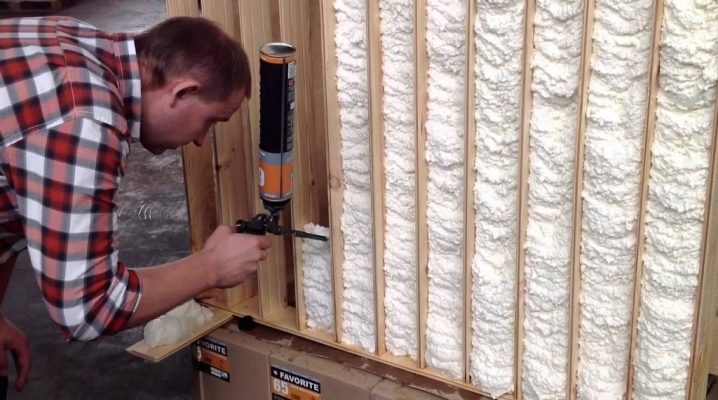
Very often, the issue of wall insulation arises in private houses, especially if they were built with their own hands. In order to achieve the best results with the least amount of effort and time, it is necessary to use the right materials. The best of them at the moment is construction foam.
Peculiarities
In order to insulate walls in any home, it is best to use polyurethane foam. This type of foam hardens very quickly, which makes it possible to obtain a dense surface in a matter of hours, which separates the interior of the room from external temperature changes, drafts and moisture penetration.

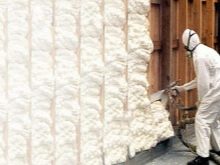
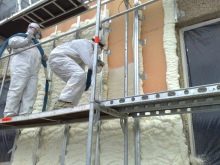
The main characteristics of the foam are:
- heat resistance - the material can withstand heating up to eighty degrees;
- capable of passing water if necessary;
- the ability to provide vapor barrier;
- high level of strength;
- increases in volume after application.
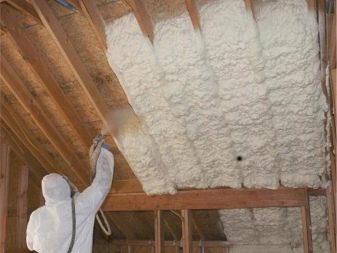
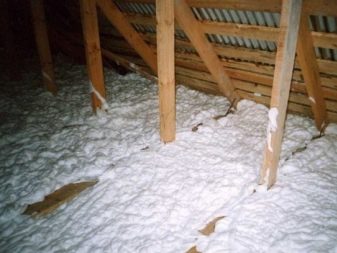
When using this material, you can not worry that the structure of the walls can easily ignite, because the foam resists this in every possible way. With all the positive aspects of this material, there is also one negative aspect in it. It concerns the ability to freeze. Eating foaming something in a closed space, it does not freeze. In addition, the high cost of these products does not allow everyone to use foam for wall insulation in the house.
With constant contact with an aqueous medium, this material begins to deteriorate and eventually becomes completely unusable. Foam application requires good ventilation, which means that certain conditions must be created for work. This material has a low vapor permeability, so it is important to make forced ventilation in the room.
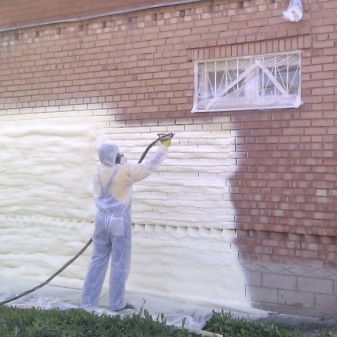
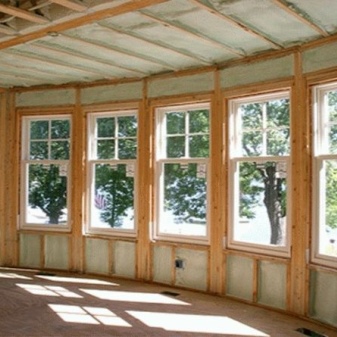
When applying foam with a thickness of four centimeters or more per square meter, you will need to use one balloon. In order to be able to do the job correctly and without risk to health, it is important to work with a pneumatic gun. This is a special equipment that helps to spray foam evenly over a certain surface.
Such a gun mixes foam with gas and delivers it to the surface.by spraying evenly where needed. With the help of such a device, you can independently adjust the intensity of the foam supply for more comfortable work. It is very convenient to use a pneumatic gun in work, but not everyone uses it due to the high cost of such equipment.
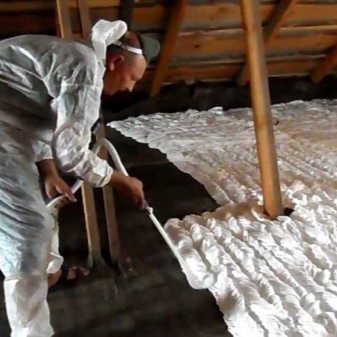
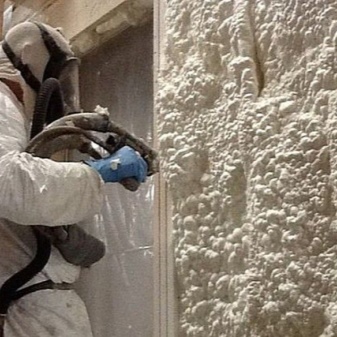
When applied to the surface, the foam does not form any seams, which is convenient and aesthetically pleasing. This material has minimal thermal conductivity. An important indicator is its environmental friendliness - when used, no harmful substances enter the air. Any impact on the foam will be painless for it, it reacts poorly only to ultraviolet radiation.
When insulating a room, it is advisable to take care of sound insulationwhich foam also does well. In addition, it has good adhesion to the surface. Foam can be easily applied to uneven surfaces, while the formation of air pockets is completely eliminated. Fast hardening allows you to continue working in a day. Foam for wall insulation is a versatile and convenient option, with the help of which even a non-professional can do everything well and efficiently, the main thing is to observe safety precautions.
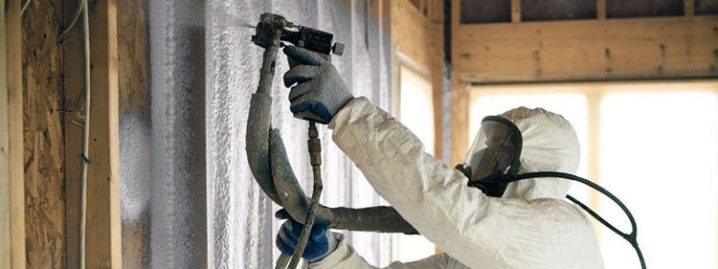
Views
As the use of foam becomes more and more frequent, the increase in its types will not be accidental.
At the moment, there are four types of polyurethane foam, including:
- assembly room;
- two-component polyurethane;
- liquid;
- penoizol.
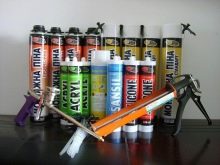
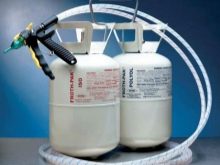
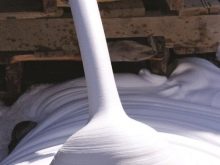
If we talk about polyurethane foam, then it is a one-component substance that can be easily applied to the surface. Such foam is found in cylinders and is supplied to the outside using compressed gas. This option is least suitable for wall insulation, because the applied layer has an open-type cellular structure that easily absorbs moisture and has low thermal conductivity.
This type of foam is recommended for small areas.that need to be closed, to remove cracks, a gap or to eliminate a draft, and for a large amount of work, an exclusively two-component substance is needed. The two reactants allow the finished material to foam and expand. Such cells are already of a closed type and freeze very quickly.
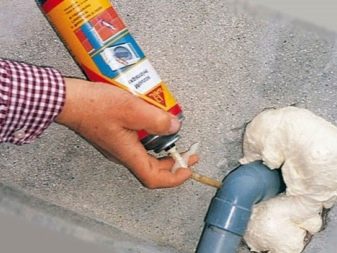
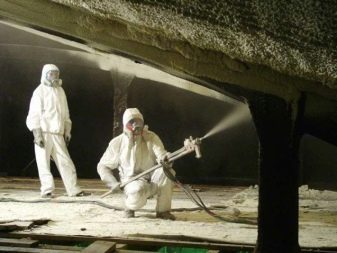
A two-component mixture, also called polyurethane, is a type of foam that is the most suitable option for wall insulation. Penoizol has similar characteristics, but their compositions are completely different. When the foam is applied to the surface, the resin is mixed with the hardener, and the foaming process takes place by squeezing the air.
Industrial foam is a suitable material for wall insulation in any building. Such an eco-friendly insulation will allow you to get the maximum result without any harm to your health. A simple polyurethane foam is suitable for filling a small profile, but for large areas the material should be different.
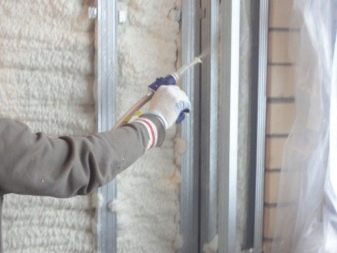
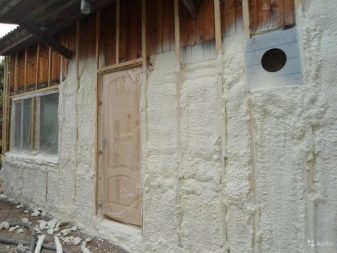
Two-component insulation foam will be the best choice for working on the entire wall surface.
Scope of application
Due to the variety of foam options, you need to know where exactly it can be used. With the help of penoizol, you can make thermal insulation of the frame room.
It can be used to fill in the spaces between:
- walls both outside and inside;
- walls and plastic sheeting;
- walls and plasterboard coverings;
- floor and new flooring.
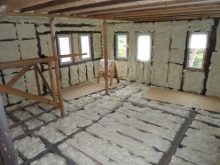
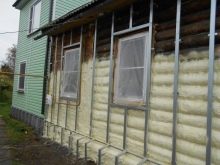
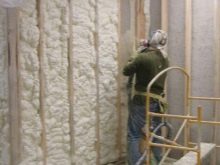
It is the use of wet insulation that allows you to create good protection for the facade of the house. All precipitation and external factors that will act on it from the outside will not in any way affect the quality of the material and will not spoil it.
Polyurethane foam is used to fix boards, which are made of solid materials with good thermal insulation and it is also used to fill the joints between them. This can help with the laying of the foundation and the installation of the ceiling. Using polyurethane, it is best to close up small gaps, fill cavities when installing windows or pipes, this material also helps from cracks on the walls themselves.
Good results can be achieved when insulating a frame house with polyurethane foam, its roof, attic, facade and even basement. For the winter, it is very important to take care of all problem areas so that in severe frosts you do not feel drafts and do not risk the integrity of the house, which can crack from large temperature changes.
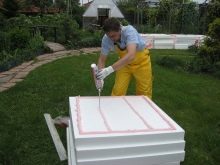
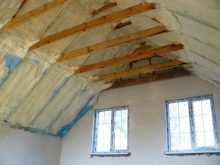
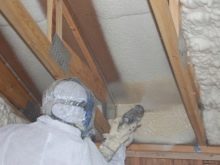
Subtleties of application
Any repair work requires skills and abilities, without which it is difficult to achieve good results. The same can be said about working with polyurethane foam. It is recommended to work with this material only for those who know what to do with it and know how to work with it.
If this is not possible, then it is necessary to take into account several basic nuances that will help facilitate the work and make it safer:
- any work must begin with preparation;
- before applying the substance, it is necessary to read the instructions and use protective equipment for the face and hands;
- finishing work requires a certain order of actions, which should not be violated.
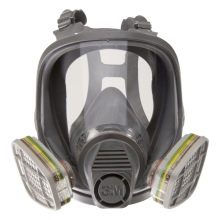

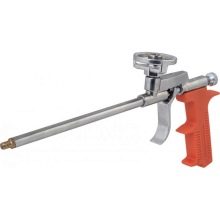
When planning to close up holes, irregularities and cracks on the walls, large preparatory work will not be needed. In order to apply the foam where you need it, it is important to create a frame on the wall, which will be divided by planks into compartments, each of which will be filled in turn. After creating the lathing, you need to take time to protective measures and prepare for the use of foam.
It is advisable to purchase a special protective suit, have gloves and a mask on your face. It is very undesirable to allow foam to get on the surface of the skin, because it will not be possible to remove it either with solvents or other substances and for a long time it will not disappear anywhere.
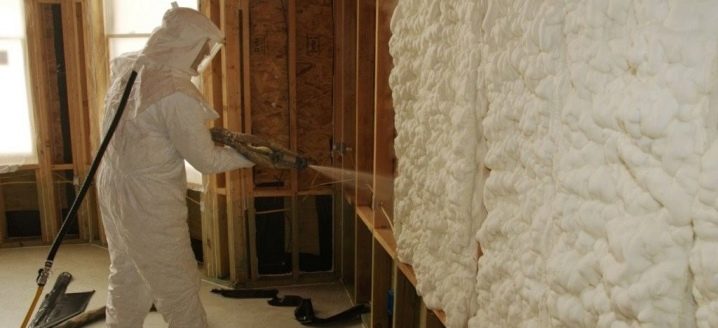
In the event that the wall is already finished, then two holes for the hose are made to insulate it, in the middle and at the top, and the process of filling the voids from bottom to top begins. The holes must be sealed when they are no longer needed in the work, otherwise the foam will begin to flow out of them. The substance is applied at a distance of thirty centimeters, after which the expansion of the material in the wall cavity is checked. If it is not enough, then you need to add a little more foam on top.
In a closed wall, it is difficult to see the state of filling the cavity and it is almost impossible to understand when to lift the hose, therefore it is easiest to fix it securely and remove it after complete completion of the work. The final stage is characterized by waiting for the complete solidification of the material, which can reach three days. It is very important to constantly ventilate the room so that fresh air can circulate in it. When everything is completely dry, you need to level out the foam and then sew it up with a sheet of drywall.
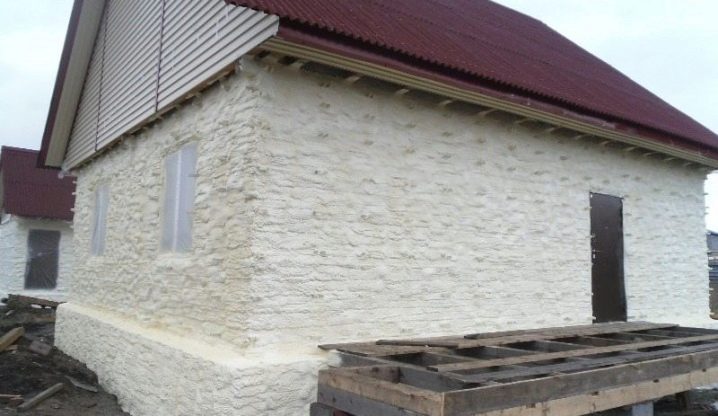
If there is no need to use additional material, you can apply plaster to the leveled foam and bring it to the desired appearance of the finished surface. The frozen foam turns out to be quite dense, therefore it is not at all necessary to hide it behind some additional materials, it is not afraid of mechanical damage, therefore direct finishing will be the most logical and inexpensive option. In the case of filling the slots upon completion of the work, it is necessary to remove the protection and eliminate the drips, if any.
Do-it-yourself foam application is facilitated by the use of an appropriate apparatus, which helps to distribute the material between the profiles, which gives the best result.
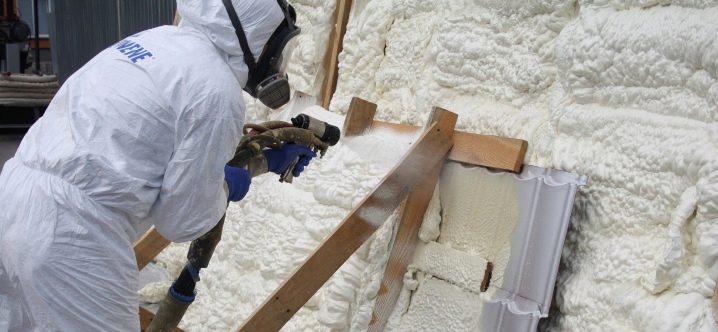
The installation of such profiles will be mandatory for any surface.whether it's a wall or a ceiling. It is important that the foam comes into contact with the frame and is securely attached to it, ensuring the strength of the structure. Spray foam will foam as you work, so it is important to keep track of the amount of material being applied. It is best if the surface layer of the entire wall or ceiling is the same as possible, which will save you from additional measures to level it.
Advice
Each master has his own secrets in working with foam, which he does not give out to anyone, but for beginners they will not be so important.
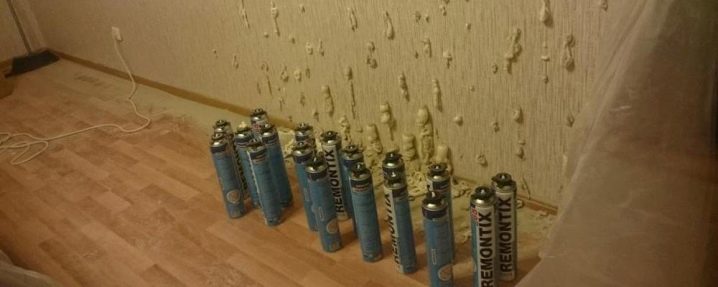
In this case, it is necessary to clearly follow the basic rules and recommendations that will help to achieve the desired result:
- Purchase of polyurethane foam only in specialized stores where they sell licensed goods with optimal shelf life. It is best to calculate the required amount of the substance and buy everything in one go. Quite often in such stores you can buy or even rent the necessary equipment for work.
- To work with foam, it is worthwhile to initially think over the ventilation system, because without high-quality ventilation, foam hardening will be difficult and the quality of work will be weak.
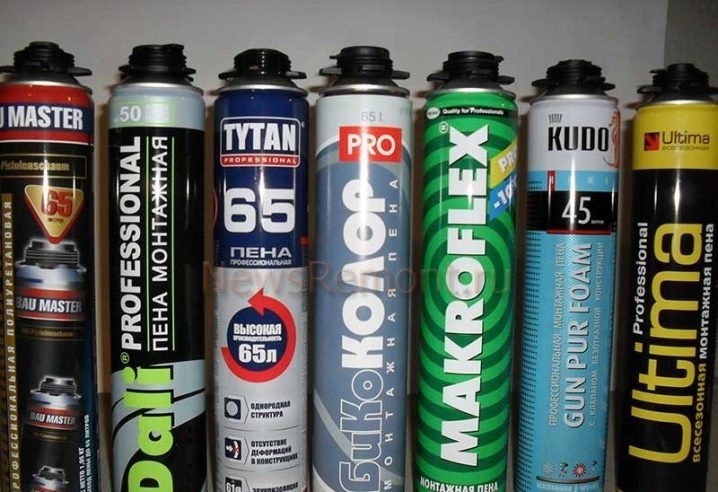
- You should not work without a protective suit and mask, any contact with the skin will be extremely undesirable, and especially dangerous if it gets on your face.
- Before foaming a large space, it is necessary to check the expansion percentage of the foam in order to navigate the size of the layer to be applied to the surface.
It is possible to insulate the wall with foam with the necessary equipment, important knowledge and compliance with safety rules. It is better to start work of such a plan by filling up small cracks and holes in order to learn how to work with a pneumatic gun, to understand the principle of applying material to the surface. For large volumes, it is important to build a cladding that will gradually fill.
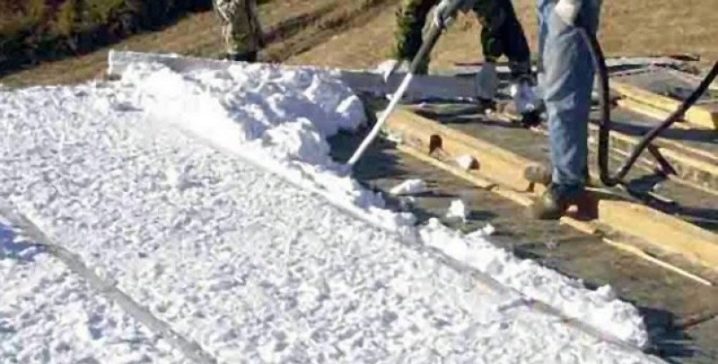
When choosing foam in a store, it is important to pay attention to what containers it is sold in.
There are various options for their volume. This is necessary in order not to buy too much, if you need to patch up just one crack or hole, or not to collect a huge number of cylinders when there is a lot of work to be done. The choice of a specific brand is already a personal matter, but it is recommended to purchase products from more well-known brands. They monitor product quality much more closely.
See the following video for the process of wall insulation with foam.













The comment was sent successfully.